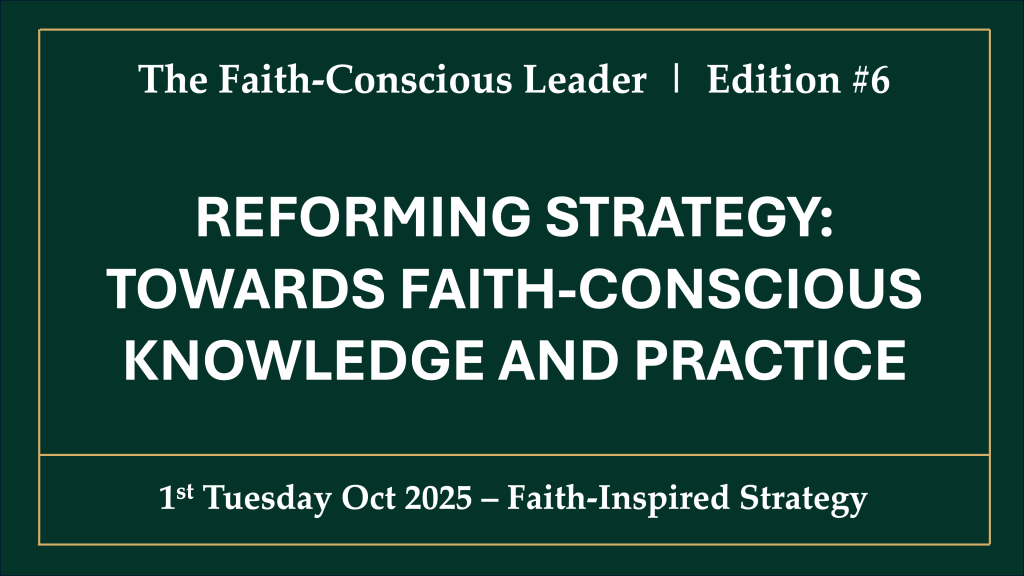Reforming Strategy: Towards Faith-Conscious Knowledge and Practice

– Why Muslim leaders must unlearn defaults and generate autonomous frameworks of strategy
UNDER ATTACK, OBVIOUS AND NOT SO
The attack on humanity of late has me lost for extremely negative adjectives. We awaken and we don’t want to allow the way of the perpetrators to go on. We find in our ways, big or small to counter these madness with what should be absolute right.
For both the blatant transgressions that are reported and streamed on our daily screens, and the “silent killers” that over the decades we allowed ourselves to be programmed with, we want to find and implement better ways.
In Edition #1, I lamented on the silent killer of coloniality: the unseen continuation of colonial mindsets in leadership and strategy. Over our professional lifetime, colionality continues in the way we define “success,” “progress,” “business” and “strategy” today. Like a fish in water, we swim along not really aware we are in water.
We seek what Al-Attas called autonomous knowledge, so that we can bring reform to the status quo. But the challenge is whether we can, as faith-conscious leaders produce knowledge and act upon success, progress, business and strategy, so as to be free from the harmful sides of imported paradigms.
STRATEGISTS BEWARE!
God warns us against adopting oppressive frameworks:
“Do not incline toward those who do wrong, lest you be touched by the Fire…” — Qur’an 11:113
The Prophet (Peace Be Upon Him) pointed out:
“You will most certainly follow the ways of those who came before you, arm’s length by arm’s length, forearm’s length by forearm’s length, hand span by hand span, until even if they entered a hole of a mastigure (a small lizard) (lizard) you will enter it too” — Hadith
⚠️ If Muslim leaders are not deliberate, we adopt paradigms of strategy that center profit, domination or material growth, sidelining ihsan, amanah and accountability before Allah.
MODEL? WHAT MODEL?
I’ve read numerous frameworks for strategy and business models.
Porter’s Five Forces, Balanced Scorecard (Kaplan & Norton), Blue Ocean Strategy (Mauborgne & Kim), Business Model Generation (Osterwalder & Pigneur) and the bibliography goes on.
Don’t avoid them. They are excellent, but be inquisitive on their grounding, i.e. on capitalistic premises. Each brings implicit assumptions (e.g. competition, growth, “market” rationality and universality of the model) that can be questioned from a faith-conscious lens.
I’ve started reading last year’s Venture Meets Vision: Aligning People, Purpose, and Profit to Innovate and Transform Society (Arun Gupta, Gerard George & Thomas Fewer). The book is optimistic, and I am putting in my twist of faith to it, insha Allah.
To produce autonomous knowledge and then act upon it, it calls us to revisit and reconcile the possible ways forward, so that they become rooted in Qur’anic guidance and Prophetic practice, while still making them relevant for modern contexts. We need to balance apparent opposites such as:
- “do good” (khair) and “make money”
- market share and value creation
- SWOT integrating taqwa, tawakkul and istikharah
- impact for shareholder return, together with legacy (waqf, sadaqah jariyah)
- people as “personnel,” “human resources,” “human capital” or “talent” reframed to “people as amanah”
BIG STEPS, SMALL STEPS
There are movements and works going on to integrate faith, moral philosophy and harm-avoidance into core logic of strategy. In big ways and small ways, how can we act on realizations we already have?
In my small example in the following video, I share my latest approach on one element of strategy: pricing.
(If you can’t view the above video, click here.)
The scholarship model is one “pricing” pathway among others like PWYC (Pay What You Can), PIF (Pay It Forward), Sliding Scale, Foundation-based, Waqf-based and Gift Economy that I am studying or beginning to pilot.
☺️ Talking about PIF (Pay It Forward), last week a young couple with an 8-month old baby in a restaurant paid for the lunch my wife and I enjoyed, after we had met them in the lift exchanging pleasantries. “Someone paid for your lunch.” The cashier could have added, “You’re invited to do the same when you can!” In future, I’ll give the cashier my bill amount, for the next customer’s meal, insha Allah.
BROAD GUIDELINES
Strategy classics assume the firm is an economic actor optimizing profit, but Islamic strategy might treat the firm also as a custodian (khalifah) or service vehicle.
Critique the assumptions: e.g. many modern models assume unlimited growth, perfect information, rational actors or risk neutrality. We can highlight how in many Muslim societies, these assumptions don’t hold (community obligations, ethical limits, hidden costs, etc.).
Look for alternatives and hybrid models: works like Venture Meets Mission or purpose-ized strategy models are possible bridges we can adapt into faith-conscious autonomy.
Embed faith into the canvas: when we discuss business model innovation, consider additional factors (e.g. khair [goodness], taqwa [God consciousness] and impact beyond wealth) when we use clinical models like Business Model Canvas.
Historical/contextual depth: while many models are recent, we can research how Islamic civilization had models of waqf, joint ventures (mudarabah, musharakah) and public-private cooperation centuries ago. We should see how modern works are actually restating in secular language what was once more integrated.
REFLECTION
It is not easy to deprogram ourselves, like I shared above on how long it took me to shift my pricing strategy. Colionality is invisible, cloaked in education, business schools, entrepreneurship courses, consultancy and coaching culture.
However, as faith-conscious leaders we must be willing to critique and unlearn, then re-learn from sources of autonomous knowledge. Examples (Workship Labs, Barakah-centered productivity, etc.) I mentioned in Edition #1 attempt to do this. I continually look out (Will you share with me?) for other endeavours.
As leaders, do we dare to let faith, not coloniality be the compass for strategy?

One Comment